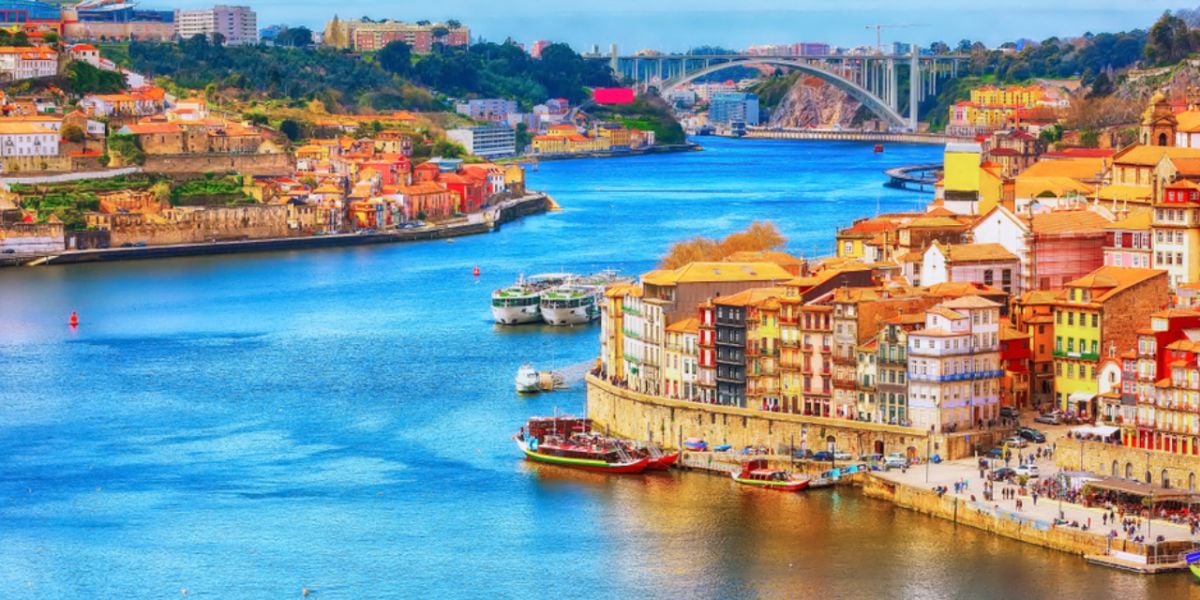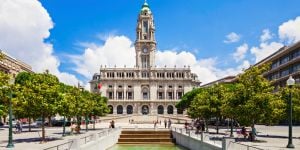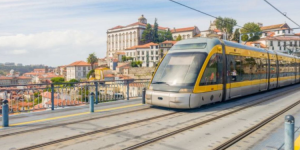
The process of choosing a city to live in is not an easy one. We understand the responsibility inherent in such a choice, and therefore, we want to share some relevant information about Porto to help you make an informed decision. Furthermore, if you want to truly embrace Porto's culture, then getting acquainted with the locals is a must! Once you're up for it, making new friends will be rather easy, as people in the northern districts are famous for being the nicest, most welcoming, and most genuine in the country.
Socializing in Porto can be quite easy
Meeting friends for food, drinks and coffee is a very Portuguese thing to do. In Porto, people don't simply meet up to talk and catch up. There's always some food and drinks added to the mix. You will hear lots of friends agreeing to “meet up for a cup of coffee” and then not drinking coffee at all! They will end up having ice cream by the beach or simply going for a walk and wrapping it up with dinner somewhere. 'Having a cup of coffee' is just an expression used to agglomerate all the different options of conviviality, so feel free to suggest different activities any time someone invites you for a cup of coffee.
Getting to know Porto and its history is a very interesting way of understanding some of its people's features. Listen to Fado in a typical restaurant, eat a Pastel de Nata, try a Francesinha and go for a football match at the Estádio do Dragão. Stroll along the Matosinhos promenade during summer nights and throw a barbecue event at your place, add some beer to the mix, and there you go, a perfect feast. One thing you must know is that most locals are more willing to embrace different activities, events or meetups during weekends or holidays. Therefore, you might have a hard time gathering people for some night drinks on weekdays.
Furthermore, we recommend not missing out on any of the local festivities, which will undoubtedly allow you to properly feel like you're part of the city, its culture, and its people. Senhor de Matosinhos occurs in May, and São João (Celebrations of Saint John) take place in June — so be ready for a lot of grilled sardines, bell peppers and local music (we call it “Pimba”). Although June is the month when the city's most popular patron saint is celebrated, there are plenty of small-town celebrations all over the Summer months.
Regarding São João, the biggest party in the city, this is the perfect time to mingle with the locals since everyone goes out on the streets dancing and celebrating through the districts of Matosinhos, Foz do Douro and Baixa (Downtown). People will dance with you, buy you drinks, ask you to buy them drinks in return, and hit you in the head with plastic hammers (don't ask questions – it's tradition!). It may sound very unusual, but it is part of the fun.
The name “Portugal” derives from the city of Porto
Locals say it was the city of Porto that lent Portugal its future name… and they're not wrong!
Long before the current nation of Portugal was even a thing, the northern region was a Roman settlement called Portus Cale, which means Port (or Harbour) of Cale, which probably derives from Callaeci, the name of the Celtic tribe that inhabited this part of the Iberian Peninsula. This settlement sat on what is now the metropolitan region of Porto.
As centuries went on, the region started being referred to as Portucale, and was eventually incorporated into the Kingdom of León and Castile (predecessor of Spain). During this time, most of the Iberian Peninsula was occupied by the Moors, so there were frequent battles for territory between the Iberians and the Muslim dynasty. As a thank you gift for his contributions and feats in battle, the Castilian King offered Portucale (back then called Condado Portucalense) to nobleman Henry of Burgundy, whose son – D. Afonso Henriques – would eventually secede from “Spain” and declare the independence of Portugal, in 1143.
From then on, the Portuguese would eventually expand south and conquer land from the Moors until they reached the Algarve, keeping those borders to this very day. Throughout almost 1000 years, the country kept the name of Portugal, but it all started with the Roman settlement of Portus Cale, in present-day Porto!
Tourism and hospitality are the fields with the highest demand for labor in Porto
Although unemployment rates in Porto are currently low, the cost of living has soared, and most of the opportunities available don't provide much in terms of wages, work-life balance or long-term stability.
In fact, many of these vacancies are entirely related to the recent boom in tourism figures. There is a high demand for cleaning workers, cooks, servers, managers, and receptionists — every single job you can consider in the hospitality industry. However, not every company looks for the most skilled professional, and, in many cases, the job gets done by the one who asks for the smallest paycheck. The tourism industry is still a very challenging area, as workers tend to be burdened with overextended schedules and below-average wages. As it so often happens in most developed nations, menial jobs are often undertaken by immigrants, who sadly sit at the bottom of the food chain. As a result, the far-right is growing and more and more locals blame it on migrants for their lack of opportunities when it comes to good jobs and livable wages.
To make matters worse, most of these workers are often paid minimum wage, which currently stands at 870€/month. It's also not rare for employers to compensate their workers with a little sum “on the side” to avoid taxes, which is obviously an illegal practice in Portugal.
People in the north are known for having great work ethics
To a fault! Usually, in the north of the country, there is a popular saying implying that “Coimbra is the city where people study (home of the oldest university in the country), Porto is the city where people work, and Lisbon is the city where money is spent”, in a frequent critic to a country that insists on focusing too much of its investment, infrastructure and cultural offerings in the capital. In fact, that's something you need to be prepared for. Although Porto is a big city with plenty going on, most internationally relevant events – such as concerts, exhibits, festivals, business conferences or sports events – will likely take place in Lisbon, over 300 km away.
Plus, Porto and its outskirts are often considered the main industrial hub in Portugal, serving as home to plenty of factories and blue-collar workers. As a result, people in the north (including Porto) are generally seen as dedicated and hardworking, often willing to clock in extra hours without gaining anything in return. Fortunately, this last bit is slowly disappearing, as younger generations are no longer available to work for free. Be that as it may, most people in Porto are still quite career-oriented and tend to work harder (and longer) than their counterparts in the south.
Porto is currently going through a housing crisis
Sadly, renting options in Porto are rather limited, and prices have been on the rise. In fact, according to the Housing Anywhere International Rent Index, average rent prices for an apartment in the city in the first quarter of 2025 hover at around €1200 (7.6% drop from 2024). If you prefer a small studio, prepare to pay upwards of €900, while average rentals for a bedroom in a shared apartment will set you back €450/month. This is a tremendous challenge for a city where the average wage stands at around 1,400€/month (before taxes), as most locals find themselves priced out of the housing market.
As for buying, and though property prices may seem tame for most Western Europeans, Porto still boasts some of the highest in Portugal. According to the local real estate website Idealista, property prices in Porto have risen 10% since June 2024, currently sitting at 2,926€ per square meter. Naturally, prices are way higher in the city center, where the price per square meter reached a staggering 4,551€ in July 2025 (going up 10% from 2024). Imovirtual states that your average home is Porto is currently listed for 395,000€, 14% more compared to last year. To try to put a stop to price escalation, the government suspended the Golden Visa Scheme program in Porto, which allowed foreign investors to live legally in the country and apply for citizenship after 5 years if they bought 500,000€ worth of property.
To try to lower the weight of taxes on homebuyers, the government approved a new legislative package in 2024 seeking to support people under 35 to buy their first homes. As many people struggled to leave their parent's nest due to house prices, legal residents (foreigners included) between 18 and 35 can now rely on the State to finance up to 10% of the property price. Furthermore, this new legislation exempts new buyers from most taxes related to the process of buying a home, such as the IMT (tax over property transactions) and its respective stamp duty. As expected, this created a spike in demand, driving home prices even higher.
Porto boasts one of the top 300 universities in the world
According to the famous and reputed 2025 Shanghai Ranking, the Universidade do Porto is ranked among the top 300 in the world! The ranking highlighted the institution's work in Food Science (top 75), Pharmacy (top 75), Biotechnology (top 100), Mathematics (top 150), Ecology (top 150), Civil Engineering (top 150), Veterinary Sciences (top 150) and Biomedical Engineering (top 200). At the same time, the University was also heavily featured in the QS World University Rankings by Subject 2025, ranking in 31 fields and topping national charts in no less than 15 areas.
However, if you're completing a specific degree and are looking for the best Portuguese university in that area, a more detailed analysis is required. According to the Financial Times, the School of Economics of the University of Porto (FEP) ranked 39st on a list of the top 100 European Business Schools in 2024. On the other hand, the University of Porto is among the best in the country for students of architecture, biological sciences, engineering, accounting, IT and medicine, overall ranking on the top 500 universities in the world according to THE rankings.
Although they didn't make the ranking, other well-rated institutions of higher education in Porto include Escola Superior de Enfermagem (Nursing), Instituto de Contabilidade e Administração do Porto/ISCAP (Accounting, International Commerce and Corporate Communication) and Universidade Católica Portuguesa (private).
Porto has plenty of beaches and great surfing spots
With many beaches within 20-30 minutes of the city center, surfing is another sport that some Portuguese natives are very passionate about. Most beaches like Matosinhos, Leça da Palmeira and Miramar will have surfing boards for rent and even surfing schools if you are new to the sport. However, keep in mind that the north of the country is rather infamous for its icy-cold water, so the experience may not be particularly pleasant unless you are properly equipped.
On the other hand, if you're willing to get in the car (or public transport) and go on a day trip, you have the world-famous “Canhão da Nazaré” just a couple of hours away. This is the place where the tallest ever surfable waves were recorded (including the tallest one), so it's a place only pros should try. The whole area is surrounded by alternative beaches with great waves for amateurs and enthusiasts alike.
Finally, if surfing isn't your thing and you just want to enjoy a different day at the beach, you can follow the course of the Douro and try a handful of river beaches in Gondomar, Amarante or Marco de Canaveses.
Porto is the home of port wine
Probably the city's most famous export, this is the land of port wine! If you're a fan, you'll be glad to hear there are countless wine cellars located by the river in Vila Nova de Gaia, where you can have a tour, try a few different varieties, and learn more about this sweet, fortified drink.
Aside from port wine, and given the city's strong connection to the Douro River, “vinho verde” is also extremely popular (and prevalent) in Porto. Produced further north in the Minho region, usually in vast vineyards where grapes are cultivated in terraces by the river, this wine is fizzy and dry and traditionally known for being a “silent killer” – meaning you won't notice you're getting light-headed until you get up from your chair!
Cordoaria and Galerias de Paris are the best places in Porto for a night out
If you want to party all night and have a great time, there is an insane plethora of discos, bars and nightclubs in Porto that will be happy to accommodate visitors! The Galerias de Paris is the quintessential nightlife street in the city, flanked by dozens of small bars and clubs, and one of the hotspots where everyone gathers on Friday and Saturday nights.
Nearby, Piolho Bar is also a place of academic tradition and part of every student's vocabulary while in Porto. It started off as an ordinary bakery but quickly turned into a small must-visit for drinks and snacks. It is so popular that the name of the old bakery is now used to actually describe the entire area around it. It's located in the quarter of Cordoaria, where hundreds of students gather every single weekend to drink on the streets. Nearby, Espaço 77 is another crowd pleaser, and officially the bar where the highest number of 200ml beer bottles (called “minis”) is sold every year in Portugal.
Locals in Porto are nicknamed “Tripe Eaters” (Tripeiros)
Why, you might ask? During the Age of Discoveries, when planning the Conquest of Ceuta back in 1415, King João I of Portugal asked Porto's local authorities for help. Understanding the importance of such a battle, the people decided they would donate every single piece of meat available to the war effort, keeping nothing but the offal. As a result, locals had to put their imagination to the test in order to craft tasty dishes out of the parts no one else wanted.
One of those dishes is called Tripas à Moda do Porto, whose main ingredient is – you guessed it – pork tripe! This has become a staple of local cuisine, and it's still widely served in most traditional joints, earning the “portuenses” (Porto locals) the unflattering nickname of Tripeiros (Tripe Eaters). Though most people from other cities use it in a demeaning way, locals have actually fully embraced it, calling themselves “tripeiros” with pride.
People in Porto curse.. Like, a lot!
People in Porto are known to “use curse words like they are commas”. They are brash, harsh and loud, but that doesn't mean they are mad or in a bad mood. It's just the way they communicate! So once your Portuguese starts picking up, do not be surprised at the number of bad words the average “Portuense” spits out daily, as they tend to curse to express even good emotions, such as surprise, fun, happiness, and even to show affection.
Although you are free to join in and no one will bat an eye at your curse words, that doesn't mean everything goes! In fact, there are quite a few faux pas that are highly frowned upon in Porto. First off, don't stare at people. Staring is highly frowned upon in the city, and you might get yourself in trouble if you do it too much. Also, don't expect older people to speak English. Although younger generations generally have no problem speaking English, older people simply do not speak it. They will still try to help you, though!
This is an important one - don't dare to compare Porto to Lisbon. Unless you are making Porto look better than the capital, comparing the city to its rival is a major no-no. Another pretty relevant advice would be not to approach locals in Spanish. Portuguese people speak Portuguese! Jokes aside, most locals will not find it very amusing if you simply assume Spanish is their mother tongue. Extra tip: Do not say “gracias” under any circumstances. If you want to thank someone, use “obrigado” (if you're a man) or “obrigada” (if you're a woman).
Lastly, don't stress how cheap you find the city. Listen, we get it that Porto can be considered cheap or affordable by most North American or Western European standards, but a lot of people all over the city are currently struggling to make ends meet, with a big share of the public blaming over-tourism and digital nomads for it. Enjoy, but be mindful.
We do our best to provide accurate and up to date information. However, if you have noticed any inaccuracies in this article, please let us know in the comments section below.








